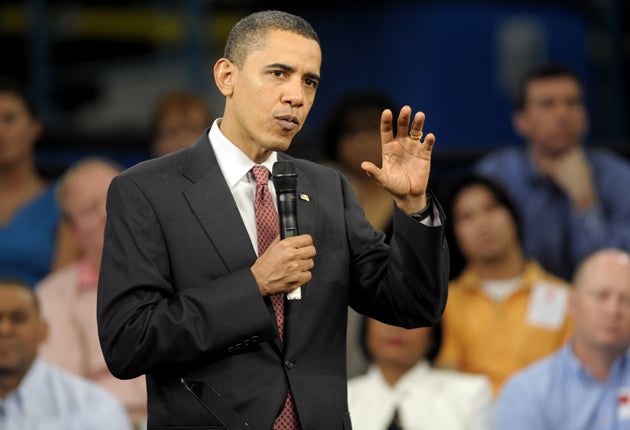Your support helps us to tell the story
From reproductive rights to climate change to Big Tech, The Independent is on the ground when the story is developing. Whether it's investigating the financials of Elon Musk's pro-Trump PAC or producing our latest documentary, 'The A Word', which shines a light on the American women fighting for reproductive rights, we know how important it is to parse out the facts from the messaging.
At such a critical moment in US history, we need reporters on the ground. Your donation allows us to keep sending journalists to speak to both sides of the story.
The Independent is trusted by Americans across the entire political spectrum. And unlike many other quality news outlets, we choose not to lock Americans out of our reporting and analysis with paywalls. We believe quality journalism should be available to everyone, paid for by those who can afford it.
Your support makes all the difference.The Obama administration is poised to adopt a new policy potentially restricting the nation's use of nuclear arms, US officials said, and hopes to persuade Russia to agree to mutual cuts in nuclear arsenals that go beyond the arms treaty both sides will sign this week.
A policy review, expected to be released today, is likely to include language reducing US reliance on nuclear weapons for its national defence.
That reflects President Barack Obama's pledge to move toward a nuclear free world, and could strengthen US arguments that other countries should either reduce stockpiles of nuclear weapons or forego developing them.
The White House also planned to urge Russia to adopt first-ever limits on shorter-range, less powerful nuclear weapons, an arena in which Russia holds an advantage, said officials.
These officials said the administration's new policy would stop short of renouncing the use of nuclear weapons except in retaliation to atomic attack, as some activists advocated. But it would describe the weapons' purpose as "primarily" or "fundamentally" to deter or respond to a nuclear attack.
Officials said the document was expected to move toward a policy that says the "sole purpose" of nuclear weapons is to deter or respond to nuclear attack.
That wording would rule out the use of such weapons to respond to an attack by conventional, biological or chemical weapons. Previous US policy was more ambiguous.
In an interview with the New York Times yesterday, Mr Obama said his administration was explicitly committing not to use nuclear weapons against non-nuclear states that are in compliance with the Nuclear Non-Proliferation Treaty, even if they attacked the United States with biological or chemical weapons.
Those threats, he told the newspaper, could be deterred with "a series of graded options" - a combination of old and newly designed conventional weapons.
Yesterday evening the White House provided a brief outline of the new nuclear policy, which it said reflects a commitment to renew arms control and work with Russia to reduce nuclear forces while maintaining a stable military balance.
It said substantial new US investments in the weapons laboratories and other technological undergirdings of the nuclear arsenal will "facilitate further nuclear reductions," and extend the life of warheads currently in the nuclear force.
"This is an alternative to developing new nuclear weapons, which we reject," the White House statement said.
The Obama administration plans to urge Russia to return to the bargaining table following Senate ratification of the new Start arms reduction treaty, to be signed by Mr Obama and Russian President Dmitry Medvedev in Prague on Thursday.
The White House hopes to overcome Russia's expressed reluctance to move beyond Start, especially if it means cutting Moscow's arsenal of tactical, or short-range nuclear arms.

Join our commenting forum
Join thought-provoking conversations, follow other Independent readers and see their replies
Comments